 MyDogBreeds
MyDogBreeds Tenterfield Terrier is originated from Australia but Mackenzie River Husky is originated from United States. Tenterfield Terrier may grow 43 cm / 16 inches shorter than Mackenzie River Husky. Tenterfield Terrier may weigh 17 kg / 37 pounds lesser than Mackenzie River Husky. Both Tenterfield Terrier and Mackenzie River Husky has same life span. Tenterfield Terrier may have less litter size than Mackenzie River Husky. Tenterfield Terrier requires Low maintenance. But Mackenzie River Husky requires Moderate maintenance
Tenterfield Terrier is originated from Australia but Mackenzie River Husky is originated from United States. Tenterfield Terrier may grow 43 cm / 16 inches shorter than Mackenzie River Husky. Tenterfield Terrier may weigh 17 kg / 37 pounds lesser than Mackenzie River Husky. Both Tenterfield Terrier and Mackenzie River Husky has same life span. Tenterfield Terrier may have less litter size than Mackenzie River Husky. Tenterfield Terrier requires Low maintenance. But Mackenzie River Husky requires Moderate maintenance
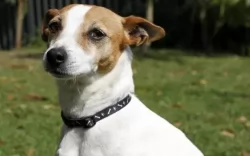 The ancestors of the Tenterfield Terrier came to Australia with the British and from them came this Australian breed. The English terriers were bred to be ratters on the ships to Australia. Today’s breed is a hardy, strong, athletic and agile dog. These first dogs were miniature Fox Terriers, bred for ratting. The miniature Fox Terrier was an established breed in the late 19th century in Australia with families and was know as a Mini Foxie. The breed became a steady presence in homes by the 1920’s.
The ancestors of the Tenterfield Terrier came to Australia with the British and from them came this Australian breed. The English terriers were bred to be ratters on the ships to Australia. Today’s breed is a hardy, strong, athletic and agile dog. These first dogs were miniature Fox Terriers, bred for ratting. The miniature Fox Terrier was an established breed in the late 19th century in Australia with families and was know as a Mini Foxie. The breed became a steady presence in homes by the 1920’s.
The breed might not have been named after the area of Tenterfield as many have guessed. Instead they may have been named after a breeder. The owner of the Tenterfield saddlery was called Tenterfield Saddler and he owned several of the breed. In 1990, Don Burke, a television personality suggested the breed be named the Tenterfield Terrier.
The Miniature Fox Terrier Club of South Australia. Now there were several clubs in Australia and a lot of disagreement about exactly what type of dog a miniature fox terrier was. Some did not think the name was legitimate, but they wanted recognition from the Australian National Kennel Club (ANKC). So, they became the Tenterfield Terrier Club of Australia in 1993. They were recognized by 2002.
Today the breed standard for the Tenterfield Terrier is different from the one for the Miniature Fox Terrier. They are now entirely separate breeds. In addition to the ANKC, the breed is recognized by the New Zealand Kennel Club but not by the AKC. It is also recognized by the American Pet Registry, Inc, the American Canine Registry and the Dog Registry of America, Inc.
 The name Mackenzie River Husky was given to these huskies by those wanting to name the freight huskies of a certain area. The name took hold in the 1960’s, but the dog began to disappear with the introduction of snow machines.
The name Mackenzie River Husky was given to these huskies by those wanting to name the freight huskies of a certain area. The name took hold in the 1960’s, but the dog began to disappear with the introduction of snow machines.
They’re a mixture of native sled dogs - Newfoundlands, St. Bernards, Staghounds and Wolf. As a mixed breed, they have always been regarded as classic sled dogs.
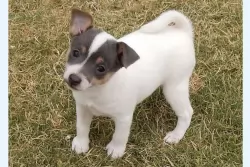 The Tenterfield Terrier is square and compact. He has a head shaped like a wedge and unusual in the terrier group. They have pricked ears and are predominantly white mixed with tan or black. They could also be tri-colored in black/tan and white or tan/liver and white. They have naturally occurring bob tails or docked tails. The nose is usually black unless the dog is liver colored, they have liver noses. The jaws are strong, and lips are tight with a strong neck.
The Tenterfield Terrier is square and compact. He has a head shaped like a wedge and unusual in the terrier group. They have pricked ears and are predominantly white mixed with tan or black. They could also be tri-colored in black/tan and white or tan/liver and white. They have naturally occurring bob tails or docked tails. The nose is usually black unless the dog is liver colored, they have liver noses. The jaws are strong, and lips are tight with a strong neck.
 The beautiful Mackenzie River Husky stands at 66 to 74cm in height and weighs between 29 and 47kg.
The beautiful Mackenzie River Husky stands at 66 to 74cm in height and weighs between 29 and 47kg.
This deep chested dog has a long, straight coat with the colors being typically wolf-like – white, cream, black, tan, blonde and red. He has erect ears, long legs and a long, bushy tail.
This wolf-type dog is strong willed and independent and was always a pack dog. They wouldn’t be described as a good choice for the first time dog owner as they do seem to have some wolf traits and will require a strong, firm, level headed owner.
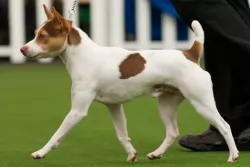 3.Adaptability – they need space even though they are small. They need a lot of exercise. They can adapt if they get another exercise. They can live in apartments and can play indoors as well as out.
3.Adaptability – they need space even though they are small. They need a lot of exercise. They can adapt if they get another exercise. They can live in apartments and can play indoors as well as out.
4.Learning ability – They are extremely intelligent, but they can be stubborn like all terriers.
 Your MacKenzie River Husky is such a likeable pet to have. True, he does tend to be a bit stubborn and independent but there is nothing that training and socialization won’t do for him. You’ll find him much more obedient and amicable, and he gets on well with children and pets in the home.
Your MacKenzie River Husky is such a likeable pet to have. True, he does tend to be a bit stubborn and independent but there is nothing that training and socialization won’t do for him. You’ll find him much more obedient and amicable, and he gets on well with children and pets in the home.
He is an intelligent dog too and very energetic so will require an owner who is active, firm and consistent. He thrives on human company and just wants to be around his owner all the time, ready to join in with any activity happening in his life.
He is therefore far more suited to life in the countryside than to the city. Loyal, devoted and loving, a MacKenzie River Husky isn’t only a beautiful dog to own, he promises to offer everything you want in a 4-legged friend.
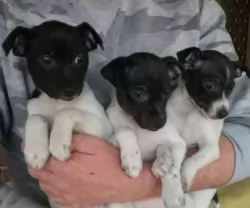 They are small in stature and because of their face they seem to have dental issues. The breed does not have a lot of health issues but deals with the same issues as many small terriers. Not all members of the breed are susceptible to these, but some are just like the Australian Terrier.
They are small in stature and because of their face they seem to have dental issues. The breed does not have a lot of health issues but deals with the same issues as many small terriers. Not all members of the breed are susceptible to these, but some are just like the Australian Terrier.
 Your MacKenzie River Husky, regardless of how healthy he is, can suffer with some common health problems that all dogs are prone to.
Your MacKenzie River Husky, regardless of how healthy he is, can suffer with some common health problems that all dogs are prone to.
Perhaps one of the more common health problems that this particular dog breed has to contend with is cataracts, hip dyslasia and hypothyroidism.
Many people associate cataracts in dogs with age, little realizing that there are many medical reasons as to why our pets develop cataracts. Cataracts can start as early as 6 months of age, although this is unlikely. They come about because of a disease which affects the lens of the eye, causing the lens to lose its transparency.
You’ll notice a whitish/grey shade in your dog’s eye and this can actually impair vision. Cataracts are particularly the lot of diabetic dogs. It can certainly help to have your dog’s eyes checked by a vet regularly.
This is another fairly common problem with Huskies. It’s almost like a death sentence if your MacKenzie is a working dog because it can lead to lameness. The disease can lead to problems in the hip joint which cab be debilitating ad give your dog a lot of pain.
It doesn’t strike old dogs only, but can be the lot of young dogs too. Sometimes treatment will require surgery but there are non-invasive options too. You want to make sure that you don’t allow your pet to become overweight as this can contribute to developing hip dysplasia.
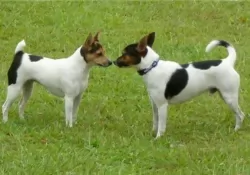 1.Feeding the puppy – Don’t overfeed but do feed high quality puppy food for small breeds and terriers.
1.Feeding the puppy – Don’t overfeed but do feed high quality puppy food for small breeds and terriers.
2.Feeding the adult – This is an active breed but don’t overfeed. Feed a high quality adult dog food for terriers or small breeds. Feed 2 times a day.
4. Games and Exercises – The breed has a high energy level and needs a lot of exercise. He is a terrier and loves to “go to ground”. Play activities that allow him to do that are best. He plays barn hunt, lure coursing and terrier specific competitions.
 Huskies like this one will require a good deal of exercise every single day. These are working dogs who have always had a job to do and you can certainly count him in when you do your hiking walks, swimming – you name it. The only thing he will object to is that he doesn’t do well in hot weather. Strong-willed, you’ll want your MacKenzie River Husky trained and socialized if you want him to be a companionable dog.
Huskies like this one will require a good deal of exercise every single day. These are working dogs who have always had a job to do and you can certainly count him in when you do your hiking walks, swimming – you name it. The only thing he will object to is that he doesn’t do well in hot weather. Strong-willed, you’ll want your MacKenzie River Husky trained and socialized if you want him to be a companionable dog.
Dogs need to be fed according to the size, their age and their lifestyle. If your MacKenzie River Husky is an active working dog, his food must be the very best and contain enough calories to cover the daily caloric expenses.
Quality and the amount of vitamins and minerals in the food is most important for a dog like this. If you feed him commercially manufactured food, make sure its high quality and not made up of fillers, and other bad stuff. Read the label and understand exactly what’s going into your dog’s stomach.
Simplicity with feeding is best for your pet. Treat him occasionally to cooked chicken, brown rice, pasta and cooked or raw vegetables which can be added into his dry kibble. A dog like this will require some raw meat as well to ensure his coat and eyes are always shiny and bright.
Grooming of the MacKenzie River Husky must be done at least twice a week to get rid of loose hairs.